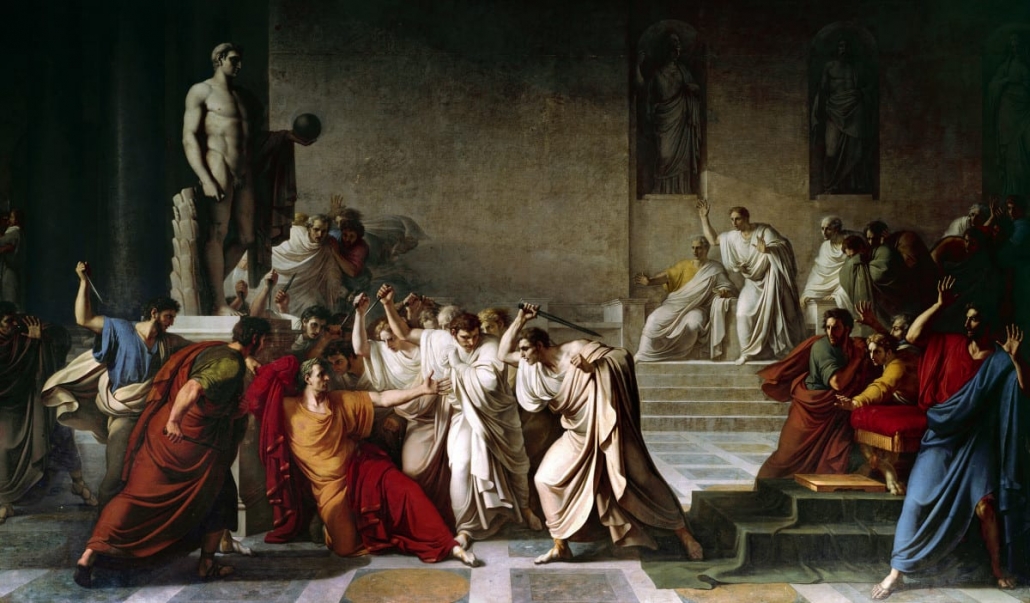Here is a brief Julius Caesar summary:
The tribunes, Marullus and Flavius, break up a gathering of Roman citizens who seek to celebrate Julius Caesar’s triumphant return from war. The victory is marked by public games in which Caesar’s friend, Mark Antony, takes part. On his way to the arena Caesar is stopped by a stranger who warns that he should ‘beware the ides of March’ (find out more about the ides of March).
Fellow senators, Caius Cassius and Marcus Brutus are suspicious of Caesar’s reactions to the power he holds in the Republic. They fear he will accept offers to become Emperor. Cassius, a successful general himself, is jealous, while Brutus has a more balanced view of the political position. Cassius, Casca, and their allies visit Brutus at night to persuade him of their views, and they plan Caesar’s death. Brutus is troubled but will not confide in his devoted wife, Portia.
On the 15th March Caesar is urged not to go to the Senate by his wife, Calphurnia, who has had dreams that he will be murdered, and she fears the portents of the overnight storms. He is nevertheless persuaded by flattery to go, and as petitioners surround him Caesar is stabbed and dies as Brutus gives the final blow. Against Cassius’s advice Mark Antony is allowed by Brutus to speak a funeral oration in the market place after Brutus has addressed the people of Rome to explain the conspirators’ reasons and their fears for Caesar’s ambition. Brutus calms the crowd, but Antony’s speech stirs them to riot and the conspirators are forced to flee from the city.
Brutus and Cassius gather an army in Northern Greece and prepare to fight the forces led by Mark Antony, who has joined with Caesar’s great-nephew, Octavius, and Lepidus. Away from Rome, Brutus and Cassius are filled with doubts about the future and they quarrel bitterly over funds for their soldiers’ pay. They make up the argument and despite the misgivings of Cassius over the site they prepare to engage Antony’s army at Philippi. Brutus stoically receives news of his wife’s suicide in Rome, but he sees Caesar’s ghost as he rests, unable to sleep on the eve of the conflict.
In the battle, the Republicans at first appear to be winning but when his messenger’s horse seems to be overtaken by the enemy Cassius fears the worst and gets his servant, Pindarus, to help him to a quick death. Brutus, finding Cassius’s body, commits suicide as the only honourable action left to him. Antony, triumphant on the battlefield, praises Brutus as ‘the noblest Roman of them all’, and orders a formal funeral before he and Octavius return to rule in Rome.
And that’s the end of this brief Julius Caesar summary. What do you think – is anything not clear? Let us know in the comments section below!

Caesar is set upon by senators on the ides of March, a key part of the Julius Caesar summary.




This summary really sucks. Nobody should ever use this website for summaries.
bruhhh you clicked on the website too, meaning you also tried to look for a summary of the book/play lazy asss bitch
I’m an English teacher…this summary is great…it would pass the quizzes.
who is the author?
William Shakespeare?
William Shakespeare
Cut the guy some slack he stayed here for what seems like 45 – 1hr, creating a summary for a book that your lazy ass wouldn’t read. or even worse there is a movie that you could have watched. you guys should learn to appreciated the little things in life and maybe you won’t be so unsuccessful in life.
Well said
bruhhh you clicked on the website too, meaning you also tried to look for a summary of the book/play lazy asss bitch
Lion king is better
Very nice and fluent.
Thnx this really helped me a lot for last moment revision
Awesome review, super short and to the point :)
i like this play most as Antony is the funniest and most intelligent person in this full play
and i think that caesar was the world’s best kng i have a query that is this play real or not
Aaaaaaaaaaaaah
What is aaaaaaaaaaaaaaaaah
Yes, this play is most certainly real- it was written by Shakespeare and is among his more famous plays. He coined the line “Et tu, Brutus?” in the murder scene of his drama.
Also, if you were wondering if this play is true history, yes, well, in a way. Yes, there was a famous, rich politician-general named Julius Caesar in early Rome. Yes, there was a Brutus. There was a Cassius. The plot line in general of Shakespeare’s play is historically accurate, though needless to say with a good bit of artistic licence. I hope that helps.
Nice!!!
never talked much on first and second triumvirate